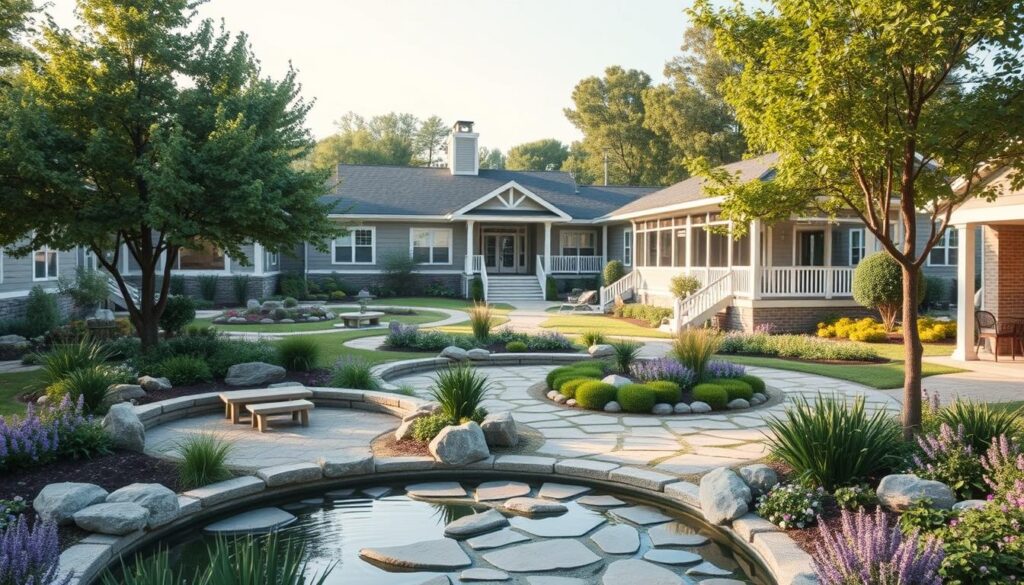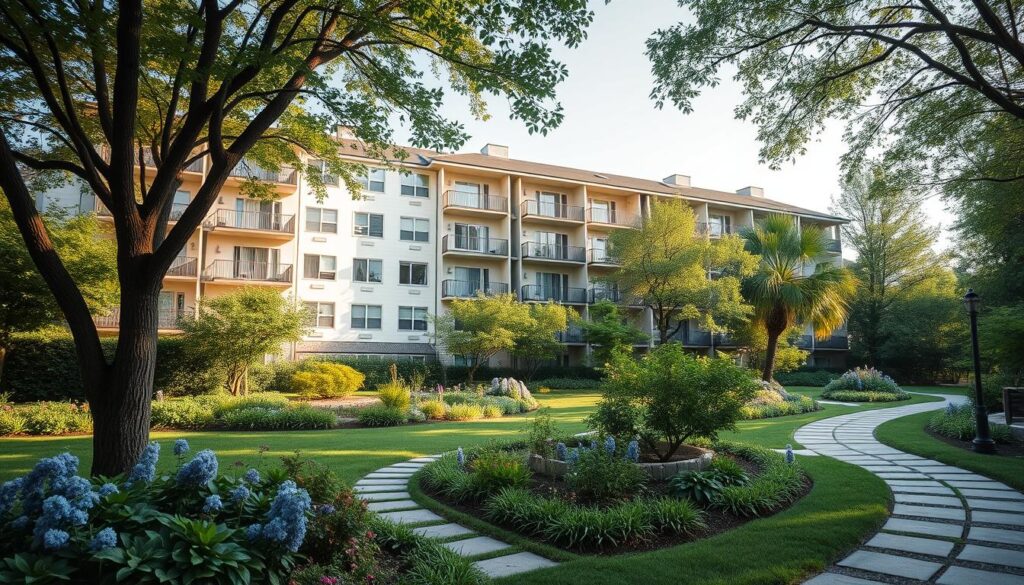If you’re struggling with a mental health issue, a residential treatment program might help. These places offer 24/7 care in a safe setting. They help with many mental health problems, addiction, and medical issues.
You can find these programs through your therapist or psychiatrist. Or, you can call your local NAMI (National Alliance on Mental Illness) for help. Dialing 2-1-1 also connects you with places that offer care, with different costs and insurance plans.
Key Takeaways
- Residential treatment programs offer comprehensive, around-the-clock care for individuals with mental health challenges.
- These facilities address a range of issues, including mental health conditions, substance use disorders, and medical needs.
- Referrals from mental health professionals and resources like NAMI and 2-1-1 can help you find the right residential treatment option in your local area.
- Both public and private residential treatment facilities are available, with varying payment requirements and insurance coverage options.
- Residential treatment provides a structured environment and 24/7 support to help individuals stabilize their mental health and work towards recovery.
Understanding Residential Mental Health Treatment Options
Residential mental health treatment centers offer full-time care for those with mental illness or addiction. They have different programs for various needs. This includes general mental health, substance abuse, and special tracks for certain groups.
Types of Residential Care Available
These centers have 24/7 care in a non-hospital setting. They help people with many mental health issues. This includes depression, anxiety, and more.
They aim to create a safe and supportive place for recovery.
Key Benefits of Inpatient Treatment
One big plus is the constant support from a team of experts. These programs use many therapies to help. This includes talk therapy, medication, and even music or art.
Duration of Treatment Programs
Programs last from weeks to months, usually about 6 weeks. They are customized to fit each person’s needs. Services include detox, therapy, and medication management.
Aftercare is also available. It offers support groups and classes to help after treatment.
Residential mental health treatment centers offer the care needed for recovery. This is true for mental illness, addiction, or both.
| Type of Residential Care | Key Features | Typical Duration |
|---|---|---|
| General Mental Health Programs | Comprehensive approach to treating a wide range of mental health conditions, including depression, anxiety, and personality disorders. | 4-12 weeks |
| Substance Use Disorder Treatment | Specialized programs for individuals struggling with addiction, often including detoxification and medication-assisted treatment. | 28-90 days |
| Specialized Tracks | Programs tailored to the unique needs of specific populations, such as women, adolescents, or those with co-occurring disorders. | Varies based on individual needs |
How to Determine if You Need Mental Health Residential Treatment
Knowing when to seek more help for your mental health is key. Psychiatric residential facilities and mental health recovery residences might be needed. This is if your symptoms make it hard to live your daily life, stay safe, or do your job.
Here are some signs you might need to stay in a place for mental health care:
- Having trouble with basic things like eating, bathing, or getting dressed
- Going through a mental health crisis or having symptoms that need constant help
- Needing more care than you can get from going to see a doctor or therapist
Talking to a mental health expert, like a therapist or psychiatrist, can help. They can tell you if you need to stay in a place for treatment. You can also use the SAMHSA Treatment Locator to find places near you.
“Inpatient therapy is the most intensive form of treatment for those with severe mental health disorders or substance use issues, offering 24/7 monitoring and intensive care tailored to individual needs and response to treatment.”
By looking at your own needs and situation, you can decide if staying in a mental health place is right for you.
Essential Components of Residential Treatment Programs
Residential treatment programs offer a full care plan for mental health and addiction. They cover many areas to help people get better. Let’s look at the main parts of these programs.
Individual and Group Therapy Sessions
These programs focus on therapy, with both one-on-one and group sessions. They use cognitive behavioral therapy (CBT) and dialectical behavior therapy (DBT). These help people change bad thoughts, learn to cope, and control their feelings.
Medication Management Services
They also have on-site care for medicine. Doctors and nurses help with medicines. They make sure any other health issues are taken care of too.
Medical Care and Support
There’s always medical help available. Nurses and doctors are there for any health problems. They make sure everyone’s health is good while they’re in treatment.
| Component | Description |
|---|---|
| Individual and Group Therapy | Evidence-based therapies like CBT and DBT to address mental health and addiction issues |
| Medication Management | On-site psychiatric care and medication monitoring to manage co-occurring conditions |
| Medical Care and Support | 24/7 access to registered nurses, nurse practitioners, and other medical staff for comprehensive care |
These parts work together for a comprehensive and holistic approach to mental health recovery in these programs.
Finding Treatment Facilities in Your Area
Finding mental health treatment can be hard. But, there are many ways to find the right place near you. If you need help for yourself or someone else, there are good places to look.
The Substance Abuse and Mental Health Services Administration (SAMHSA) has a Mental Health Treatment Facility Locator. It helps you find inpatient care close to you. The American Residential Treatment Association also has a list of places to get help.
For veterans or those with VA benefits, there’s help too. The VA has about 250 programs at 120 sites across the U.S. Your local National Alliance on Mental Illness (NAMI) can also help find places.
After finding places, check if they take your insurance. Knowing the costs is important. With the right help, you can find the best treatment for you.

Specialized Programs and Treatment Tracks
Looking for long-term mental health care or mental health recovery residences? You might find special programs for you. These programs are made just for you, to help with your specific needs and challenges.
Gender-Specific Treatment Options
Some places offer programs just for men or women. They know men and women have different needs. These programs are safe and supportive, helping you focus on getting better.
Trauma-Focused Programs
Have you been through trauma? There are programs made just for you. They use special therapies like EMDR and CBT to help you heal.
Dual Diagnosis Treatment
Do you have both mental health and substance use issues? Dual diagnosis programs help with both. They give you the care you need for a better life.
Some places also have programs for special groups. Like for military members or Native Americans. They want to give you the best care possible.
| Treatment Program | Key Features | Outcomes |
|---|---|---|
| Newport Institute Residential Treatment |
|
|
| McDowell Center for Children’s Residential Program |
|
|
Learning about these programs helps you find the right long-term mental health care or mental health recovery residences. They can support your journey to wellness.
Cost and Insurance Coverage for Residential Treatment
Getting into mental illness treatment centers or behavioral health programs can be pricey. The cost changes a lot. It depends on the place, type of facility, and services.
Inpatient care in the U.S. can cost $500 to $2,000 a day. This means a 30-day stay could be $15,000 to $60,000. But, with insurance, it might be $100 to $500 a day.
It’s key to know about insurance for these services. Laws like the Mental Health Parity and Addiction Equity Act and the Affordable Care Act help. Most plans now cover these treatments.
But, how much coverage you get can change. It depends on your insurance, the plan, and your policy. Some plans might have better rates with certain providers. Others might need you to get approval first or have extra costs.
To find out what you can get, check your insurance and talk to treatment centers about payment. SAMHSA’s Treatment Locator can help find places with lower costs or sliding scales. This makes treatment more reachable.
| Service | Average Cost | Insurance Coverage |
|---|---|---|
| Outpatient Therapy | $100 – $200 per session | Typically covered by insurance, with varying copays and deductibles |
| Inpatient Psychiatric Care | $500 – $2,000 per day ($15,000 – $60,000 for a 30-day program) |
$100 – $500 per day with insurance coverage $500 – $2,000 per day without insurance |
| Residential Treatment Centers (RTCs) | Varies from free (rare) to tens of thousands per month | Coverage varies by insurance provider, plan type, and policy |
Knowing the costs and insurance options helps you choose the best treatment. This is for your mental health.

What to Expect in a Daily Treatment Schedule
At intensive mental health treatment and therapeutic residential communities, your day is planned well. You’ll have therapy sessions, activities, and chances to join the community. Each part of the program helps you get better.
Therapeutic Activities
A typical day has many activities to help you. These include:
- Goals-oriented group therapy sessions (20% of daily schedule)
- Individual counseling (15% of daily schedule)
- Psychoeducational classes (10% of daily schedule)
- Recreational and creative therapies (15% of daily schedule)
You’ll spend about 7 hours a day on these activities. The rest of the time is for meals, breaks, and personal time.
Community Integration
Residential treatment programs focus on connecting you with others. You’ll go on outings, join groups, and learn to live on your own. For example, teens get 30 minutes of phone time each day to stay in touch with family and friends.
Recovery Milestones
As you get better, you’ll set and reach personal goals. You might see improvements in your mental health or learn new ways to cope. The daily plan and support help you stay on track and celebrate your wins.
“The structured schedule at residential treatment centers helps in providing physical, emotional safety by creating consistency and predictability.”
Aftercare and Continuing Support Services
When your stay in a mental health program ends, it’s time to plan for aftercare. Your team will help you make a plan for ongoing care. This plan is made just for you to keep you on the right path.
This plan might include things like going to therapy outside of the program. You might also get help with your medicine and join support groups. It’s all about making sure you have what you need to keep going strong.
Some places offer support for people who have finished their program. This support helps you slowly get back into your community. Being part of these groups can really help you stay on track with your recovery.


A Life-Changing Experience with This Weight Loss Supplement (Nagano Tonic)
I’ve always struggled with finding a weight loss solution that actually works for me. Like many, I’ve tried numerous diets, exercise routines, and supplements over the years—some worked for a short time, but nothing ever gave me long-term results. That was until I decided to try the weight loss supplement I found : Link to the Supplement.
From the moment I started using it, I noticed a difference. Not only did I feel more energized, but my cravings also became more manageable. The best part? I started seeing results much quicker than I anticipated! Over the course of just a few weeks, I noticed a significant reduction in belly fat and overall weight loss that I hadn’t been able to achieve before.
What makes this supplement stand out from all the others I’ve tried is how it supports me in my daily routine without any jitters or energy crashes. I’m able to stay focused and motivated, which has made it easier to stay on track with my diet and exercise plan.
This product truly exceeded my expectations, and I feel more confident and healthier than ever before. If you’re struggling with your weight loss journey like I was, I highly recommend giving this supplement a try. It’s been a game-changer for me, and I’m sure it can work wonders for you too!
Contant Them on email .. tonicnagano50@gmail.com
I’ve tried so many weight loss products over the years, but nothing worked like this supplement! Since I started using it, I’ve noticed a big difference in my energy levels and appetite control. In just a few weeks, I’ve lost weight and feel so much better. It’s been easy to stick with, and the results speak for themselves. Highly recommend this to anyone looking to make a real change!
wasn’t sure what to expect, but this weight loss supplement has really impressed me! After just a few weeks of use, I’ve already dropped a few pounds and feel more motivated to stay active. It’s helped curb my cravings and boosted my energy throughout the day. I’m excited to keep going and see even better results. Definitely worth trying!
Reach them on tonicnagano50@gmail.com
This Nagano Tonic has been amazing! In just a few weeks, I’ve lost weight, feel more energized, and my cravings are under control. Highly recommend it!
Thats the link to purchase http://surl.li/iasppy